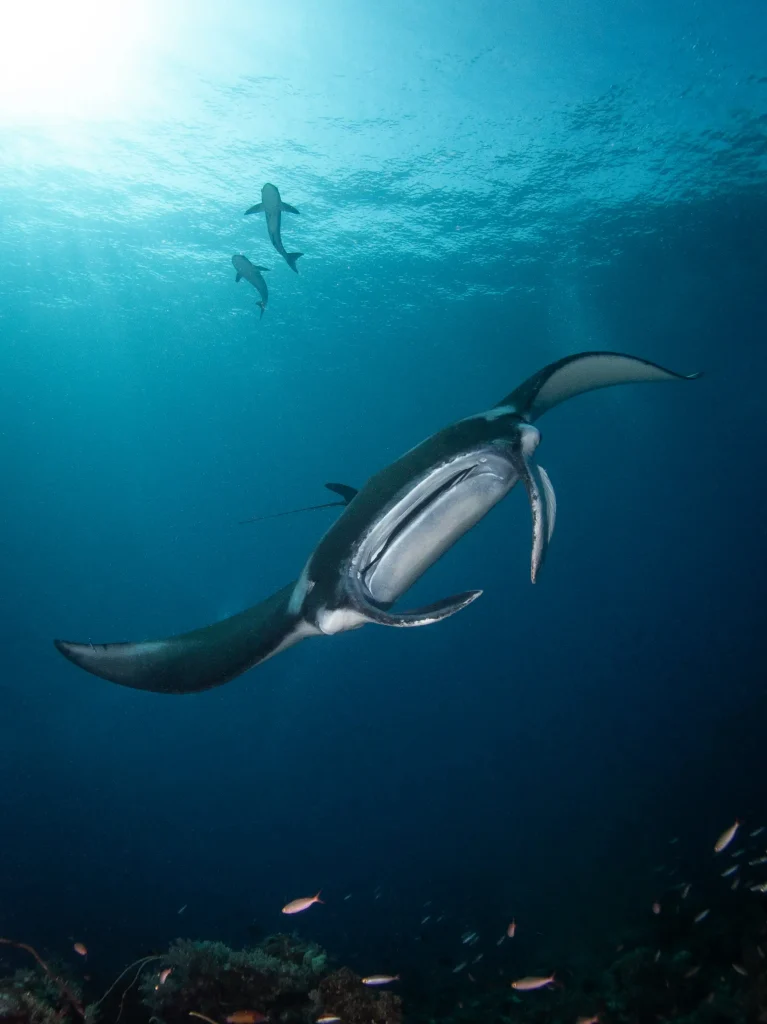Raja Ampat harbors 553 species of hard corals—about 75% of the world’s total—alongside five turtle species, 16 marine mammal species, 699 mollusk species, and more than 1,628 species of reef fish.
Endangered and protected animals here range from sea turtles, walking sharks, and manta rays to the coconut (or canary) crab, the world’s largest land arthropod. Of 258 bird species recorded, 10 are endemic to Papua and 6 of those are found only in Raja Ampat. The archipelago was recognized as a UNESCO Global Geopark in 2023.

| MPA | Year Reserved | Year Established | Total Size (ha) | No-take Size (ha) |
|---|---|---|---|---|
| Dampier Strait MPA | 2021 | 2021 | 353,440.54 | 4,112.47 |
| Fam Islands MPA | 2021 | 2021 | 359,385.65 | 20,949.29 |
| Asia & Ayau Islands MPA | 2021 | 2021 | 100,008.99 | 1,003.83 |
| Mayalibit Bay MPA | 2021 | 2021 | 49,786.82 | 556.23 |
| Misool Islands MPA | 2021 | 2021 | 348,518.74 | 756.34 |
| Kofiau Boo Islands MPA | 2021 | 2021 | 137,318.73 | n/a |
| North Misool MPA | 2019 | 2023 | 308,777.35 | 3,447.86 |
| West Waigeo Islands & Surrounding Areas Marine Reserve (Suaka Alam Perairan Kepulauan Waigeo Sebelah Barat dan Sekitarnya) | 266,695 | |||
| Raja Ampat Islands & Surrounding Seas Marine Reserve (Suaka Alam Perairan Kepulauan Raja Ampat dan Laut Sekitarnya) | 60,002 |
Zoning Map

A defining regional cultural practice is sasi—customary rules that temporarily close areas to harvesting and strictly govern who can fish, what gear can be used, and when resources may be taken. While sasi was historically run by men, several Misool Island villages (Kapatcol, Salafen, and Aduwei) now entrust women’s groups with managing these closures. In Kapatcol, the Waifuna group became the first women’s sasi group in Papuan history.
During the brief “open” period (3–7 days), they may harvest sea cucumbers, lobsters, and lola (topshells) before closing the area again for the next year. Salafen’s Zakan Day women’s group open their sasi for eight days to harvest sea cucumbers. In Aduwei, the sasi group’s Matbat language name Joom Jak Sasi means “women protecting the oceans.”


To strengthen sustainable fisheries, the organization Yayasan Konservasi Alam Nusantara (YKAN) and the Raja Ampat BLUD UPTD KKP (the local government conservation unit) are training staff and fishers to record catches and identify around 120 species of deep-sea snappers, groupers, tuna, and small pelagics, as well as the vessels operating in the area. This collaboration tackles Indonesia’s broader challenge of limited fisheries data and involves local communities directly in data collection so results can guide management across the BLUD UPTD KKP Raja Ampat work area. The Indonesian government also named Raja Ampat one of 10 national priority tourism destinations in 2020, underscoring the balance being sought between conservation and careful tourism growth.